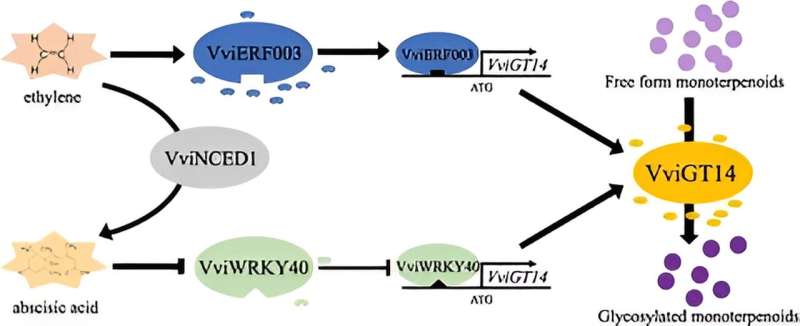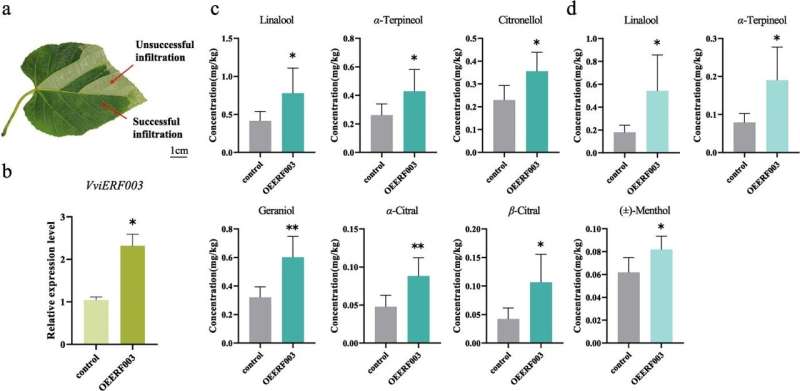
A study explores the ethylene-responsive gene VviERF003’s influence on glycosylated monoterpenoid synthesis in grapes, which are pivotal for the fruity and floral notes in wines. Understanding this genetic regulation provides insights into how wine aroma can be influenced, potentially allowing for the development of grapes with enhanced or specific aromatic profiles.
Terpenoids, the most abundant secondary metabolites in plants, play significant roles in plant-environment interactions and contribute to the floral and fruity aromas of fruits like grapes. Glycosylated terpenoids, in particular, are more stable and abundant in grapes, acting as latent aroma compounds that enhance wine flavor through gradual hydrolysis.
The transcriptional regulation of glycosylated terpenoid biosynthesis is not well understood. Due to these challenges, there is a need for in-depth research on the regulatory mechanisms involved in glycosylated terpenoid biosynthesis in grapes.
The research conducted by researchers from the China Agricultural University, published on February 28, 2024, in Horticulture Research, explores the role of the ethylene-responsive transcription factor VviERF003 in grape aroma enhancement. The study reveals that VviERF003 upregulates the expression of the VviGT14 gene, which in turn increases the production of glycosylated monoterpenoids.
The study identifies VviERF003, an AP2/ERF transcription factor, as a key regulator of glycosylated monoterpenoid synthesis in grapes. Using DNA pull-down screening, the researchers demonstrated that VviERF003 binds to the promoter of the VviGT14 gene, enhancing its expression. Glycosylated monoterpenoids, which are crucial for the floral and fruity aromas of grapes and wines, showed increased accumulation when VviERF003 was overexpressed.

The study utilized various experimental approaches, including yeast one-hybrid and dual-luciferase assays, to confirm the binding and activation of VviGT14 by VviERF003. The research also highlights the ethylene-responsive nature of VviERF003 and VviGT14.
Ethylene treatment led to significant upregulation of both genes, resulting in higher levels of glycosylated monoterpenoids in grape tissues. This indicates that VviERF003 plays a crucial role in mediating ethylene-induced aroma enhancement in grapes. Additionally, the overexpression of VviERF003 in grape and tomato plants resulted in increased production of glycosylated monoterpenoids, further confirming its regulatory role.
Dr. Qiu-Hong Pan, one of the corresponding authors, stated, “Our findings reveal a novel regulatory mechanism involving VviERF003 and ethylene in grape aroma biosynthesis. This discovery opens up new possibilities for enhancing grape and wine flavor through targeted genetic manipulation.”
The identification of VviERF003 as a key regulator of glycosylated monoterpenoid synthesis offers potential applications in grape breeding and genetic engineering. By manipulating VviERF003 expression, it may be possible to enhance the aromatic qualities of grapes and wines, providing a significant advantage for the wine industry.
This research also contributes to the broader understanding of the molecular mechanisms underlying plant secondary metabolite biosynthesis, which could have implications for improving the flavor and aroma of other fruits and crops. The study’s findings pave the way for future research and innovation in agricultural biotechnology.
More information:
Ya-Chen Wang et al, Ethylene-responsive VviERF003 modulates glycosylated monoterpenoid synthesis by upregulating VviGT14 in grapes, Horticulture Research (2024). DOI: 10.1093/hr/uhae065
Citation:
Study explores how key gene modulates terpene aroma in grapes (2024, June 14)
retrieved 14 June 2024
from https://phys.org/news/2024-06-explores-key-gene-modulates-terpene.html
This document is subject to copyright. Apart from any fair dealing for the purpose of private study or research, no
part may be reproduced without the written permission. The content is provided for information purposes only.







